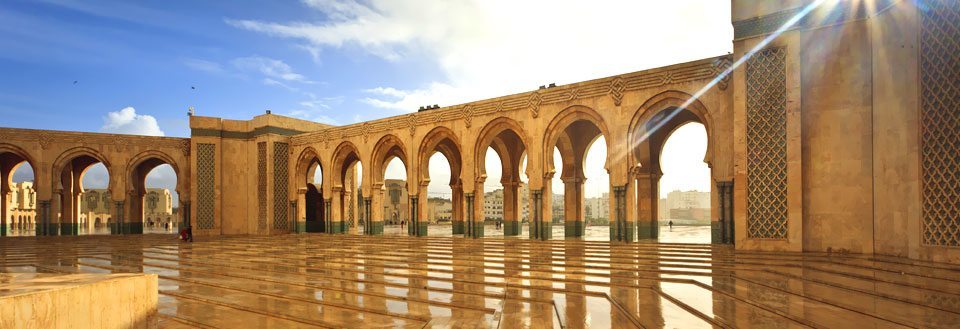Morocco is a country full of colour, mystique and wonderful scents. A visit will present you with swarming market places with a lively and chaotic atmosphere and small stalls with bric-a-brac, magic carpets and much more.�
Al Maghrib
Rabat (1,500,000)
446,550 square kilometres
Arabic
Islam
29,661,636 (1999)
Monarchy
Morocco is situated in the north-western part of Africa close to Gibraltar. The country's eastern neighbour is Algeria and its southern and south-eastern neighbour is Mauritania. The Atlas mountain range runs straight through the country and ends by the Atlantic Ocean.
You can go to Morocco all year around. The market places always bustle with activity - though if you are not happy with heat you should avoid Morocco in the summer months when temperature can reach more than 40 degrees. In the northern part of the country you can cool down in the Mediterranean Sea - and in the western part you can cool down in the Atlantic. Spring and Autumn are good seasons for a visit to the country, especially if you want to go south and visit Marrakesh.
�
Lonely Planet Morocco
Culture Shock Morocco
Fodor's Morocco
Morrocan Dirham (MOD)
There are internet cafés in all cities in Morocco
For emergency calls in Morocco dial:
Police (19)
Ambulance and Fire Department (15)
Tips are a necessary source of income to porters, guides and others of similar profession. Accordingly they should receive about a ten percent tip. At the fancier restaurants it is polite to leave a ten percent tip, while a few dirham should suffice at more humble cafés.�
When it is 12 noon in the UK (summer time), it is 11 am in Morocco.
When it is 12 noon in the UK (winter time), it is 12 noon in Morocco.
In Morocco they use the following weights and measures:
Weight: kilo
Distance: metric system
Photography is allowed most places in Morocco. Note however that the population is Muslim, for which reason special consideration has to be taken at places of religious interest. Ask before you photograph people.�
Do not drink tap-water anywhere in Morocco and avoid ice cubes. Use bottled water.�
In Morocco they use the following power source:
220 volt AC, 50 Hz.
However, in some older buildings the power source is 110 volt AC, 50 Hz.
Even though Morocco is a Muslim country casual clothing is acceptable. However, save the microscopic shorts and the tight top for the beach. As a former French colony, Morocco has adopted many of the French formalities - especially in middle class society. For example, a kiss on the cheek is common.
Banks are open from 8.30 am to 11.30 am and again from 2.30 pm to 4.30 pm (Monday-Friday), Fridays, however, the lunch break is a bit longer.
Shops and museums are open from 8 am to 6 pm (Monday-Friday). Some shops close for lunch.
Hotels and more expensive restaurants usually serve meals inspired by French cuisine. But at the less expensive eateries there is a wealth of traditional Moroccan food. Examples are harira - a spicy soup, or couscous - sometimes served with eggs, chicken or lambflesh. Tajine is a stew usually with marinated chickenflesh or lambflesh.
�
There are few facilities for disabled people in Morocco. But people are very willing to help - an offer which it is an advantage to accept. �
New Years Day, 1 January
Throne Festival, 3 March
Labour Day 1 May
Qued ed-Dahab 14 August
Independence Day, 18 November
Moveable Holidays
Eid essgher (end of the Ramadan), end of January
Eid thamukrate (Feast of Offering), around 28 March
Islamic New Year, middle of April
Ashura, end of April
Al Mouloud (birth of the Profet), around 26 June
Anniversary of the Green March, around 6 November
Beginning of the Ramadan, around 20 December.
The possibilities for camping are good both in and around the major cities in Morocco. Conditions are fairly good and inexpensive.
There are many hotels in Morocco. There are expensive, luxurious hotels, hotels of moderate standard and smaller, inexpensive ones. In the major cities such as Marrakesh, Rabat and Casablanca there are many options but normally it's a bit more expensive than in the smaller cities and towns.
Some of the smaller and more reasonably priced hotels work as a kind of guest house where you eat with the owner and the rest of the family. These private forms of accomodation are usually inexpensive.
Hostels are situated in the major cities in Morocco. But often it is just as cheap to stay in a hotel if you choose those with one or two-stars.�
Morocco has domestic flights between Agadir, Casablanca and Tangier.
Bus services are reliable and efficient in most areas. Morocco has long-distance as well as local services.
Train travel is limited in Morocco. But those services which do exist are excellent and cheap. The most popular route runs from Fès to Rabat and Casablanca. The train company ONCF operates the services between the major cities in Morocco.
Taxis are always available in the cities and the major towns. The fare is cheap but make sure to agree on a fare if the driver doesn't switch on the meter.
Car rental is rather expensive in Morocco considering the general price levels. Petrol is available almost anywhere. �
You can go from Algeciras and Malagi in Spain to Ceuta in Morocco by ferry.
Petis taxis are a common sight in major Moroccan cities. The taxis are licensed to carry three people at a time and it's a cheap and easy way to get around.
Morocco is not just heat and sandy beaches. If you enjoy trekking you'll have a good opportunity to do so. The beautiful trail between Tacheddirt and Imlil brings you to the snowy High Atlas, and then there are places for skiing. Oukaimeden, about 70 kilometres from Marrakesh, is a very popular ski resort. �
